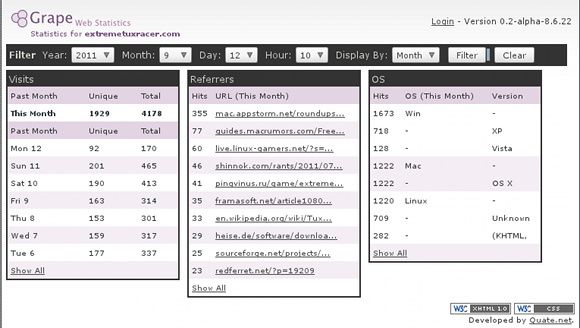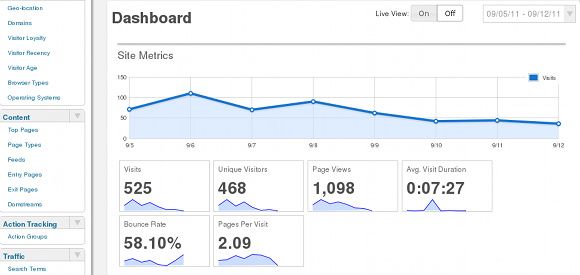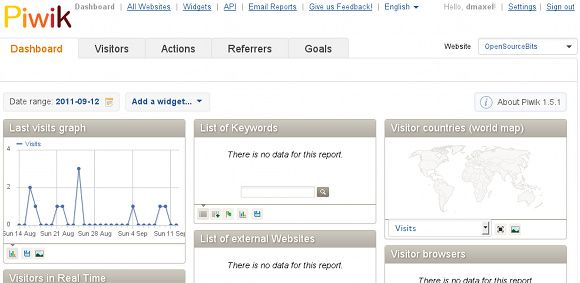If you operate your own website, analytic software can be crucial in order to track exactly how well your site is doing. Without this software, you can do whatever you want with your site, but you will never know if it is getting more visitors, aside from the amount of comments. When you look at the possible options you have for analytic software, the most popular choice is Google Analytics. However, if you're not a fan of Google or its Analytics package, there's no need to fear. There are still a handful of options for you to try out.
If you also care about the correctness of the code so that visitors can maintain their privacy, great open source solutions exist as well.
Grape Web Statistics
Grape Web Statistics is a fairly simple piece of analytics software. Grape is most appealing to those who find Google's offering to be too much or overwhelming and would like to keep things simple. Grape doesn't offer a whole lot out of the box, though if you are a good HTML and PHP developer you may be able to extend the software to meet your own unique needs.
Grape shows you some of the most commonly sought-after statistics for your site. This includes the number of visitors, the top referrers, and the operating system of each visitor. These statistics can be shown at hourly, daily, monthly, and annual levels. Specific dates can be chosen as well.
One negative side to Grape is that a new version hasn't been released in over a year, though I suppose that isn't so important if it wants to stay minimal in the amount of features it offers.
Open Web Analytics
Open Web Analytics comes in spot number 2, although it isn't far away from first place. OWA, as the website calls it, packs a much more powerful punch compared to Grape simply by its massive feature set. The software also features a great user interface that organizes all the different statistics that can be shown. There are lots of different statistics that can be viewed, such as the browser type, geo-location, top pages, search terms, search engines, and ad performance.
OWA also offers some nice visual graphs to represent certain statistics. I found that on all pages, a graph of the current number of visitors for the past few days is shown. I'm not sure if this can be turned off or modified. However, one can tell that much effort was put into making the information visually pleasing and easy to understand. The graphs are also clean, aside from some random entries here and there, such as "Default Browser" when listing the browser types or "Not Set" for geo-location.
Piwik Web Analytics
So who took the top prize? That goes to Piwik, my personal favorite for open source web analytics tools. Piwik currently has the most extensive feature set out of the three, and is under heavy active development. One of the things Piwik is best at is integration with any site. There are many, many different frameworks such as WordPress and Joomla! that have plugins for Piwik, and for any other sites you can simply add a self-generated snippet of code to your footer.
Piwik also offers easy upgrade paths. It will notify you whenever there is an update, which can be installed with a single button, much like WordPress's style of updating. This makes keeping up with the latest features and bugfixes super easy.
Even better, Piwik lets you set goals so you can actively try to reach those goals. There are many different parameters that you can set, so the sky's the limit!
Conclusion
Indeed, there are some good choices available when it comes to open source web analytics tools. Which tool you choose is up to you and your needs. Either way, they are available and ready to make you more productive.
Do you like Google Analytics? Why or why not? Let us know in the comments!
Image Credit: Laughing Squid




